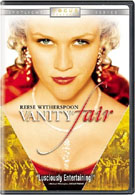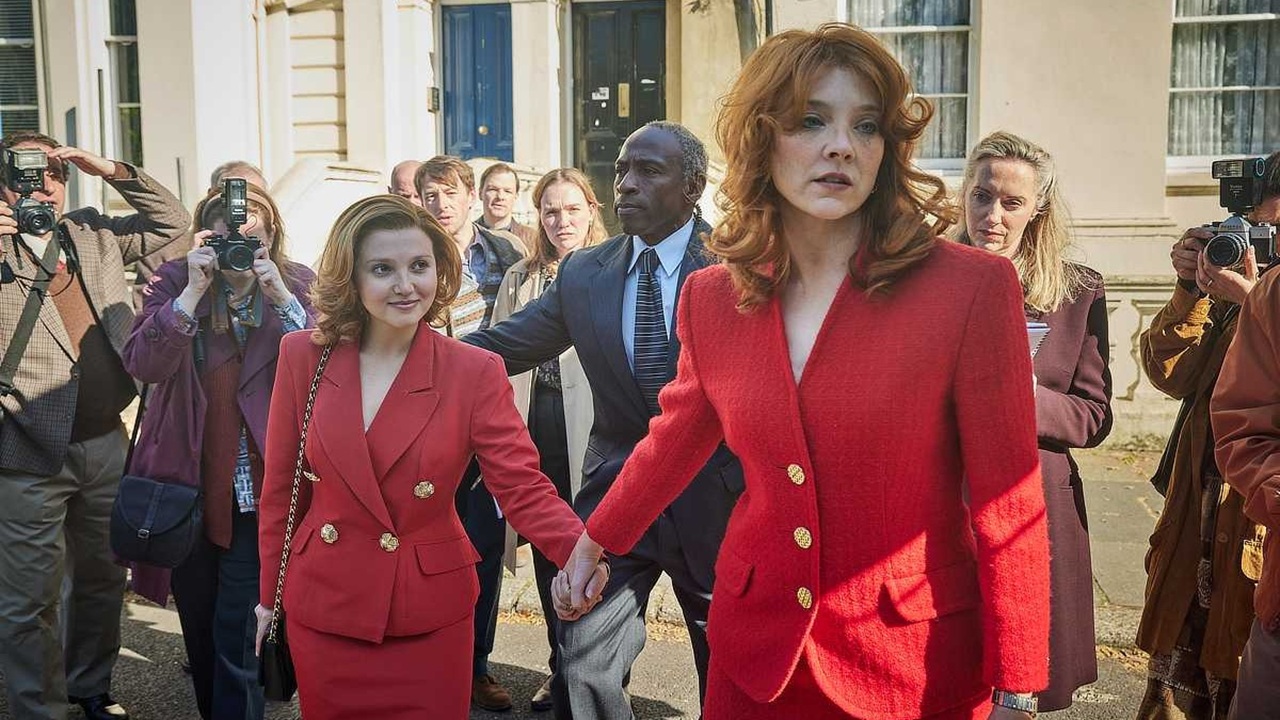Meet Rebecca Sharp, a hip, self-ruling, beautiful, lice and disease-free poor woman of London’s early 1800’s. Becky is absolutely determined to climb the social ladder, rung after rung, until she achieves…uh…I don’t know exactly…status, maybe? Anyway, the point is, she’s feisty and daring. She’s brave and witty. She’s a woman who knows what she wants in life and isn’t afraid to get it. The odds are against her, but she’s independent enough to be completely dependent on men, thus working her way to the top. God, I love a good feminist movie! Vanity Fair follows Becky Sharp (Reese Witherspoon) as she goes from being a poor woman to a governess, to a rich woman, to a poor woman, to a thrown out woman, to a rich woman. (It’s the typical street girl with book smarts setup, but then again, maybe everyone else got it from the book Vanity Fair by William Thackeray, which I haven’t read yet, by the way.) Meanwhile, her best friend, whom she rarely ever speaks to, even when they’re in the same room, goes from being a poor woman to a rich woman, to a poor woman, to a rich woman.
During this time they marry and have one child each. However, even though these are the “main” characters, you won’t see the weddings or the births, and there are huge jumps through time that will altogether make you disinterested and uninvolved. At the close of the movie there is an attempt to convince you that the women end up with who they are “supposed” to be with, but really they end up with the person they have ignored most of their lives, and the men are stupid for taking them back. Both women pretty much come off looking like shallow jerks.
Every time there is a moment of potential tension it is resolved within fifteen minutes and you’re back to wondering what the point of the movie is. Take, for instance, the two-minute war in the middle. They won and came home. Pretty much, everything was fine. The war was a tool to kill off one character, otherwise, it has no bearing on the story. There is also narration through the reading of letters that strives to bridge the gaps in time and acquaint you with other characters. However, what you see is a room of twenty people talking, and what you hear is one snippet of information about one or two people that aren’t particularly highlighted by the camera shot. The result? Utter confusion. “What’s going on? Who’s that? I don’t understand what they’re doing. Where are they?” Stuff like that.
In Vanity Fair you are thrust into a romanticized London of the early 1800’s. Somewhere along the line there’s an Indi-pop dance routine, and after two hours, Reese Witherspoon lets out a crying scream that finally makes her Becky and not Reese Witherspoon, but by then there are only about fifteen minutes left to enjoy her as a good actress. There is an eerie cinematic grandeur to the movie that makes me think maybe it’s just me, and I want to see it again just incase it’s something I’m missing or I’m not understanding. If I could figure out who’s who among the characters maybe the rest of the story and its meaning will fall into place. After only one viewing, Vanity Fair is more like a model search in the back conference room of a Holiday Inn. Everyone is one dimensional and too absorbed in themselves to learn anything from their own actions, but perhaps that’s why it’s called Vanity Fair. The bonus features on the disc help tremendously. There isn’t much in the way of how they put sets together or the accuracy of costume design, stuff you’d expect to see following a period movie, but there is insight into the intentions of the director and what messages Nair is trying to convey.
The “Women Behind Vanity Fair” section wasn’t anything spectacular, they just pointed out that most of the crew were women but I didn’t find anything overall interesting about it. The deleted scenes are okay. There’s an alternate beginning as well as an alternate ending. The ending could have changed things by bringing out the ideas of love conquering vanity and tying in the title of the movie somewhat. I kept thinking of the tagline-all’s fair in love and war-but I couldn’t place that with the title until I saw this alternate ending and had watched the behind-the-scenes look.
In the “Welcome to Vanity Fair” section you get a bunch more information on the ideas of materialism and attachment to wealth. Looking at society today, you see not much has changed in 200 years, thus making the movie and book a timeless story with a very universal and multicultural message. You also get a bit of history on England and their obsession with India during that time period which helps to prop the movie up and stand a little taller.
My problem is, while I totally agree with what they talk about, I wish it came across through the film. Any kind of information you can give your viewer is better than saying, “let them figure it out.” Even Unbreakable gave you some history of the comic book industry before the first character was seen, so I think any kind of text or narration before the opening scene would have brought Nair’s message to the foreground. Anything! Talk about women’s roles at that time so we’ll see just how different Becky is. Talk about England’s fascination with Eastern cultures during the 1800’s. Talk about how tightly linked status was with wealth. Anything to get the point of the movie across to the viewer and have them thinking about it throughout the film, not months later when the DVD comes out!
Your Daily Blend of Entertainment News
The audio commentary with director Mira Nair is absolutely amazing! Her voice is mesmerizing and quickly sucks you into her world and views of the book and film. You can tell she took such care and paid such attention to analyzing the book that each scene, background detail, and camera swipe is intentional and with purpose. Nair has examined Becky’s character as well as the whole book and tried not to omit a single detail. I don’t think anyone would be disappointed or uninterested when listening to her speak virtually nonstop about the film, its direction, and why scenes were filmed the way they were.
The extras are a must when it comes to watching this film. There’s no way you could watch the movie and really enjoy it without them. Being Reese’s biggest fan wouldn’t be enough, you need the whole package to appreciate Vanity Fair. I know my first impression of it wasn’t good, but after the behind-the-scenes and the commentary, I’m looking forward to watching it again. It might be possible that Vanity Fair is like a fine wine and will get better after each viewing.

